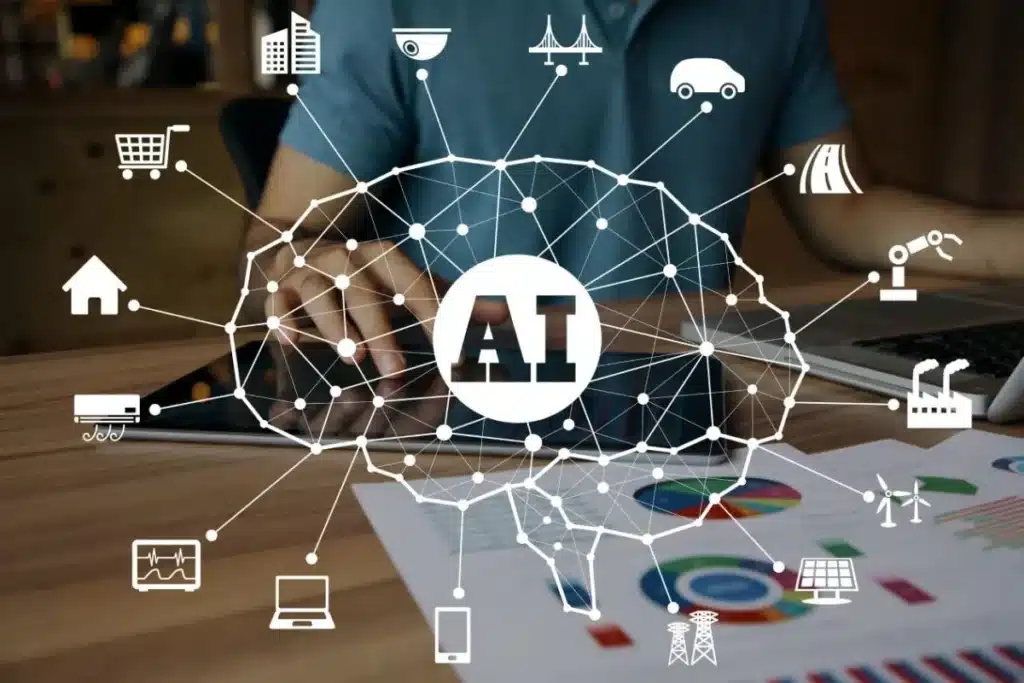(Learning)Artificial intelligence (AI) and machine learning (ML) have achieved mainstream status in the digital age, radically transforming the way we interact with technology. This comprehensive analysis will explore the continued growth of AI and ML, unraveling the key reasons behind their rise. From specialized expertise to personalized strategies, we will examine how these technologies not only save time and resources, but also redefine the business and technology landscape.
In the fast-paced digital landscape, artificial intelligence (AI) and machine learning (ML) stand as driving forces that have transformed the way we interact with technology. This comprehensive analysis will dive into the steady growth of AI and ML, unraveling the root causes of their prominence. From the specialized expertise brought by professionals in these areas to the customized strategies implemented, we will thoroughly examine how these technologies, beyond optimizing the use of time and resources, are comprehensively redefining the business and technology landscape, unleashing unprecedented innovations and possibilities.
Specialized Expertise in Artificial Intelligence:
AI is not just a technology; it is a specialized discipline that requires deep expertise. We will explore how specialized AI expertise becomes a crucial differentiator. From programming complex algorithms to implementing predictive models, specialized expertise is the engine that drives the effectiveness of artificial intelligence.
In the vast technological horizon, artificial intelligence (AI) distinguishes itself not only as an innovative tool, but as a specialized discipline that demands deep expertise. This in-depth analysis will explore how specialized AI expertise becomes a critical differentiator. From the creation of complex algorithms to the implementation of predictive models, specialized expertise acts as the catalyst that powers the efficiency and impact of artificial intelligence in diverse fields.
Personalized Machine Learning Strategies:
The real magic of machine learning lies in its ability to adapt and learn from data. We will analyze how personalized strategies in machine learning are redefining personalization in various industries, from e-commerce to healthcare. We will study cases that demonstrate how the automatic tuning capabilities of ML models create more personalized experiences for end users.
In the dynamic universe of machine learning, personalized strategies emerge as a core element redefining the way we interact with technology. This in-depth analysis will explore how machine learning, with its intrinsic ability to adapt and learn from data, is shaping personalized strategies that cut across industries. From precise product recommendations in e-commerce to the personalization of medical treatments, we will examine cases that highlight how the flexibility and adaptability of machine learning are driving highly personalized experiences, marking a milestone at the intersection between technology and individual needs.
Saving Time and Resources with Artificial Intelligence:
AI-driven automation is a catalyst for significant time and resource savings. From business process automation to supply chain optimization, we will explore how AI is transforming operational efficiency. We will analyze case studies that illustrate how companies can maximize their productivity by leveraging the capabilities of artificial intelligence.
Relevant Keywords in the Field of Artificial Intelligence:
In the vast digital universe, keywords are compasses that guide visibility. We will explore key terms such as “deep learning,” “neural networks,” “cognitive automation,” and “enterprise artificial intelligence.” These keywords are crucial for search engine optimization and standing out in a crowded digital landscape.
Impact on Business Innovation:
The integration of AI and ML not only improves existing operations, but also catalyzes business innovation. We will analyze how these technologies are enabling companies to develop new products, services and business models. We will study cases that demonstrate how AI-driven innovation has become a key factor in staying competitive in the digital age.
In the business world, the integration of artificial intelligence and machine learning acts as a transformative catalyst, driving not only the improvement of existing operations, but also a revolution in business innovation. We will explore how these technologies not only optimize processes, but also open the door to the creation of new horizons. From innovative product development to reinventing business models, we will examine cases that illustrate how artificial intelligence has become the driving force behind innovation, enabling companies to navigate competitive waters and excel in the ever-evolving digital age.
Security and Ethics in Artificial Intelligence:
As AI becomes ubiquitous, security and ethics become imperative. We will explore how companies are addressing ethical challenges, such as algorithmic fairness and data privacy. We will look at specific cases that highlight best practices to ensure that artificial intelligence is implemented in a safe and ethical manner.
In the vast landscape of artificial intelligence, security and ethics emerge as crucial guiding beacons. As companies plunge into the realm of AI, concerns about addressing ethical challenges and ensuring data security become imperative. From fairness in algorithms to safeguarding privacy, we will explore how organizations are adopting ethical approaches and robust security strategies. Through detailed case-specific analyses, we will examine the best practices that companies are implementing to ensure that artificial intelligence is not only powerful and efficient, but also secure and ethical at its core.
Emerging Trends in Artificial Intelligence:
The field of artificial intelligence is constantly evolving. We will investigate emerging trends, from federated learning to quantum artificial intelligence. We will analyze how these trends are shaping the future of artificial intelligence and how companies can prepare to adopt these innovations effectively.
In the dynamic and ever-changing domain of artificial intelligence, emerging trends are the compass that guides the next phase of development. From the convergence of artificial intelligence with the Internet of Things to the implementation of increasingly advanced language models, we will explore the innovations that are shaping the future of machine learning and algorithmic decision making. This comprehensive analysis will unravel how these trends are redefining the boundaries of what is possible in artificial intelligence and how organizations can strategically position themselves to take full advantage of these emerging innovations.
Integrating Artificial Intelligence into the Customer Experience:
Customer experience is at the epicenter of many business strategies. We will delve into how the integration of artificial intelligence is transforming the customer experience, from AI-powered chatbots to personalized recommendation systems. We will look at examples that highlight how AI is improving customer satisfaction and generating long-term loyalty.
In today’s business world, the integration of artificial intelligence into the customer experience has transcended conventional boundaries, becoming a key driver of loyalty and engagement. We will explore how companies are using advanced analytics to understand customer preferences and needs, delivering personalized experiences that go beyond expectations. From automated response systems to virtual assistants, this detailed analysis will examine how artificial intelligence is redefining customer-business interaction and setting new standards for service excellence.
Challenges and Myths in Implementing Artificial Intelligence:
Despite its benefits, the implementation of artificial intelligence is not without its challenges and myths. We will address common concerns, from organizational resistance to lack of understanding about how AI works. Using concrete examples, we will explore how companies can overcome these challenges and fully leverage the potential of artificial intelligence.
In the complex landscape of artificial intelligence, the associated challenges and myths often stand as significant obstacles for businesses. From the mistaken belief that AI will completely replace human workers to concerns about the lack of transparency in algorithms, there is a diverse set of myths surrounding this technology. This comprehensive analysis will explore these misperceptions, demystifying misconceptions and providing clear insight into how to overcome the challenges associated with implementing artificial intelligence. With specific examples, we will highlight effective strategies to take full advantage of AI capabilities and ensure a smooth transition towards its integration into various industries.
Promising Future of Artificial Intelligence:
In the conclusion, we will project a glimpse into the future of artificial intelligence. We will discuss how AI is expected to continue to evolve and transform various industries. We will look at case studies that illustrate how companies can prepare for an AI-driven future and how anticipation and adaptability will be critical to continued success in this exciting technological journey.
On the horizon of technological development, the future of artificial intelligence (AI) looms as a transformative force that redefines the very nature of our interactions with technology. As we move forward, AI will not only continue to evolve in terms of capability and sophistication, but will also become even more integrated into our daily lives, altering paradigms and generating unprecedented opportunities.
This comprehensive analysis projects a promising future where artificial intelligence becomes an increasingly indispensable ally, catalyzing innovations in medicine, education, mobility, and beyond. By exploring cases that highlight the expansion of AI in key sectors, we understand that adaptability and human-machine collaboration will be essential to fully harness the transformative potential of this revolutionary technology.
- Human-Machine Collaboration:
Human-machine collaboration emerges as a key pillar in the development of artificial intelligence. We will explore how the synergy between the cognitive capabilities of people and the processing speed of machines is shaping new ways of working. We will look at examples that demonstrate how this collaboration is enhancing creativity and efficiency in diverse work environments.
- Artificial Intelligence Education and Training:
The rapid growth of artificial intelligence has generated an increasing demand for trained professionals in this area. We will investigate how education and training in artificial intelligence is essential to close the skills gap. We will analyze innovative educational programs and training strategies that enable individuals and companies to acquire competencies in this evolving discipline.
- Impact on Health and Medicine:
The application of artificial intelligence in healthcare and medicine is revolutionary. We will delve into how machine learning algorithms are transforming medical diagnosis, drug research and patient data management. We will study specific case studies that highlight how AI is contributing to significant advances in medical care and improved patient outcomes.
- Sustainability and Energy Efficiency:
Artificial intelligence is also playing a crucial role in the search for sustainable and energy-efficient solutions. We will explore how machine learning algorithms are being applied to optimize energy consumption, improve resource management and develop more environmentally friendly technologies. We will analyze examples that highlight how AI can contribute to building a more sustainable future.
- Development of Ethical Artificial Intelligence:
Ethics in artificial intelligence is an increasingly relevant topic. We will investigate how ethical guidelines are being established to guide the development and implementation of AI systems. We will analyze cases of companies and organizations that are adopting sound ethical principles to ensure that artificial intelligence is used responsibly and with consideration for social implications.
- Integrating Artificial Intelligence into Cybersecurity:
Cybersecurity is a critical aspect in the digital age, and artificial intelligence is playing a crucial role in protecting against cyber threats. We will delve into how machine learning algorithms improve attack detection, prevent fraud, and strengthen online defenses. We will look at examples that demonstrate how AI has become an indispensable ally in the fight against cybercrime.
- Development of Accessible Artificial Intelligence:
As artificial intelligence becomes ubiquitous, accessibility becomes a critical factor. We will explore how accessible artificial intelligence solutions are being developed, from inclusive user interfaces to adaptability of algorithms for diverse needs. We will analyze cases that highlight how AI can be designed to benefit everyone, regardless of their capabilities or limitations.
- Applications of Artificial Intelligence in the Creative Industry:
Artificial intelligence is making inroads in the creative industry, from content generation to artistic production. We will investigate how machine learning algorithms are being used in the creation of music, visual art and multimedia content. We will study examples that illustrate how AI is pushing the boundaries of creativity and generating new forms of artistic expression.
This comprehensive analysis has explored the fascinating and continuing growth of artificial intelligence and machine learning. From specialized expertise to emerging trends, we have broken down the key reasons behind its rise and its impact on various sectors. In a world where innovation is constant, artificial intelligence is positioned as a key driver for progress, efficiency and societal transformation. As we move into a new era of innovation, artificial intelligence is becoming a key driver of progress, efficiency and societal transformation.
This comprehensive analysis has explored the fascinating and continuing growth of artificial intelligence and machine learning. From specialized expertise to emerging trends, we have broken down the key reasons behind its rise and its impact on various sectors. In a world where innovation is constant, artificial intelligence is positioned as a key driver for progress, efficiency and societal transformation. As we move into a new era of innovation, artificial intelligence is becoming a key driver of progress, efficiency and societal transformation.
fascinating journey of artificial intelligence and machine learning, we envision a future where the collaboration between human creativity and machine analytics redefines the way we live, work and interact with technology. These advances, from medicine to autonomous driving, represent more than just technical achievements; they are milestones in our society’s evolution toward a paradigm where innovation and ethics converge.
As machines learn from vast data sets and adapt to our changing needs, there is a pressing need to ensure that this technological revolution is inclusive, ethical and benefits all strata of society. The onus is on designers, developers and leaders to shape a future where artificial intelligence not only improves our efficiency, but also elevates our capabilities and inspires us to explore new horizons.
Artificial intelligence presents itself as an ally in solving complex problems, from healthcare to climate change mitigation. However, this powerful tool must be used with care and consideration. The creation of ethical algorithms and the application of fair principles are essential to prevent inequalities and ensure that everyone benefits equitably from this technological advancement.
As we venture into territory where artificial intelligence is integrated into our daily lives, we are presented with the opportunity to shape a future where technology not only enhances our lives, but also reflects our deepest values. The key lies in the continued collaboration between the human mind and the processing power of machines, forging a path toward a tomorrow where innovation becomes a driving force for global well-being.
In short, artificial intelligence and machine learning are not just technological tools; they are catalysts for transformative change. In this journey into the unknown, it is our responsibility to be guided by ethics, inclusiveness and the constant search for a future where artificial intelligence is a positive force, working hand-in-hand with humanity towards new frontiers of possibility and discovery.
Examples of Artificial Intelligence and Machine Learning Applications:
Advanced Medical Diagnostics:
Application: Machine learning algorithms analyze medical images to detect patterns and anomalies that might be difficult for the human eye to identify. This streamlines the diagnostic process in areas such as radiology and pathology.
Virtual Assistants and Chatbots:
Application: Companies use artificial intelligence-powered chatbots to interact with customers in real time. These systems understand questions, provide accurate answers and can perform specific actions, enhancing the customer experience.
Personalized Recommendations on Streaming Platforms:
Application: Streaming platforms such as Netflix and Spotify use machine learning algorithms to analyze users’ viewing or listening history and deliver personalized recommendations, improving user retention and satisfaction.
Supply Chain Automation:
Application: Companies use AI algorithms to forecast demand, optimize shipping routes and manage inventories. This leads to a more efficient supply chain and significant cost savings.
Automatic Language Translation:
Application: Platforms such as Google Translate employ machine translation models based on machine learning. These models constantly improve their accuracy by processing large amounts of linguistic data.
Fraud Detection in Financial Transactions:
Application: Financial institutions use machine learning algorithms to analyze transaction patterns and detect potential fraudulent activity in real time, protecting customers and the company.
Autonomous Vehicles:
Application: Artificial intelligence is essential in autonomous vehicles to interpret sensor data, make real-time decisions and ensure safe driving. Companies such as Tesla use AI-based assisted driving systems.
Personalization in Digital Marketing:
Application: Digital advertising platforms employ machine learning algorithms to analyze users’ online behavior and personalize targeted ads for each individual, improving the relevance and effectiveness of campaigns.
Artistic Content Generation:
Application: artificial intelligence tools, such as OpenAI’s DALL-E, generate images and unique visual content from textual descriptions. This has applications in the creation of digital art and graphic design.
Accurate Weather Predictions:
Application:Machine learning models process large sets of weather data to provide more accurate predictions. This helps in the planning and mitigation of extreme weather events.





